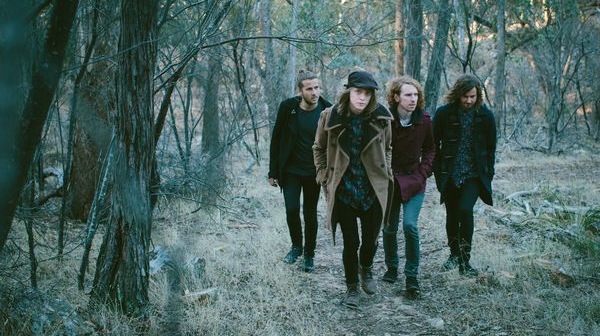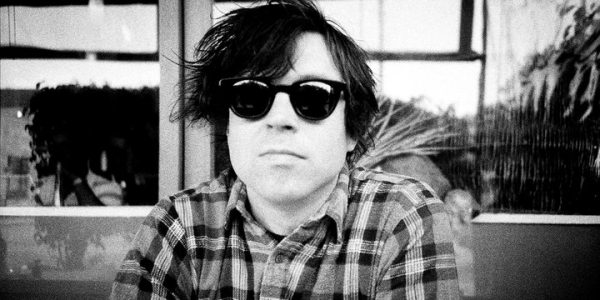“When it happened, we absolutely had no intention of ever, ever coming back,” Wright says. “There was a long period where we didn’t even speak. Maybe a year and a half. I didn’t speak with any of the other members of the band. There was a bit of bad blood. The breakup came out of the blue, too. It all happened within maybe two weeks. We’d just finished up on the Big Day Out tour, which was amazing, and then all of a sudden things just turned to shit. Yeah – we definitely had no intention of coming back, but I guess two years later I bumped into Clint [Ellis, lead guitar] in the city, and we were both drunk of course, and we kind of made up. We realised that we weren’t done with TGP. We’d been going through the same kind of shit with our other bands, and realised what we’d thrown away and what we were missing. From there it was only a matter of months before we were back writing, and working on the next record.”
Released this Friday July 3, Dark Horses already has a mountain of hype behind it. The first album after a long silence is always going to be hotly anticipated, and given the reputation the band has developed for their live shows (where tickets can sell out within an hour), there are a lot of eyes on Wright and his cohorts. What listeners will most likely be first struck by is the record’s variety. There are striking contrasts between tracks like Castles In The Air and the titular Dark Horses, and great swings again across to a song like Dreamer/Parallels (featuring Melbourne rapper Freeds). If nothing else, it’s an album that keeps you on your toes.
“With any record, we’ve never really made a conscious effort to do anything in particular,” Wright says. “We wrote, like, nearly forty songs going into this album, which is more than we’ve ever done before – usually we just scrape by. To get all of them out, we’d have to release a fucking triple album or something. But this time, we really went for it, and I think it happens after a while when you’re writing that many songs, you just want to go places you haven’t really been before.
“I think the song choices for the record was just choosing the best tunes that we could,” he continues. “There wasn’t much trying to create a dynamic or anything. I think the way the record sits now, it was a very natural process. But we’ve always had a couple of songs that are left at the end of a record, and often those are the starting point for the next album. There’s always one or two songs that we overshoot where we’re at musically – we’re unable to actually achieve what we’re trying to create – but those ones are usually good starting points. Basically, we’re not going to release some fucking pile of shit, which is what most of those other songs are right now.”
In 2013, The Getaway Plan released the double A-side single Lovesick / Mirrors. It was the band’s first independent release and arguably a watershed moment in their history. Heralded by the departure of bassist and founding member Dave Anderson, the two tracks hinted at a change in the band’s sound; a maturing towards what we would hear on last year’s EP Journaux, and their material today. It also saw the guys beginning to feel confidence in their production skills.
“We’ve always recorded our own demos at home,” Wright says, “but we never went any further than that. Journaux was a very quick job, done in maybe a week. It was recorded into some really dodgy computer software on my laptop, and then a quick mix job. But those skills are very important. Not to say that we have great skills in that area, but after being in the industry for eleven years, you can’t really not pick up a skill set when you’re in the studio. We always have a big hand in producing our own records. I find it fucking annoying when bands go out and say in their credits it’s produced by the band and some producer. It’s like, ‘Well fucking duh, I’d hope so,” he laughs. “You’d hope that you’d have a hand in the production of your own fucking music, you know?”
Although he’s intrigued about what fans will think about the band’s stylistic update, Wright’s focus is far from outside reception. Having listened to the finished album only a handful of times, he is still in the process of letting go of these songs and appreciating just what each one of them means to the band.
“You know, I’ve browsed this song meanings website,” Wright says. “It’s basically like a forum where people get on and discuss what they think the stories behind songs are. There’s some pretty hilarious shit there. I think my songs are pretty cryptic anyway, at least our older stuff. A lot if it is really fucking jargon, man. I was a little kid, I barely even knew what I was doing, just putting words to paper and screaming them as loud as I could,” he bursts out laughing. “I think the songwriter in me has developed a lot more in the last five years. I think the thing is, because we’re in that middle period right now, it’s hard for me to be able to listen to the album from a different perspective. Like trying to listen to it from a fan’s perspective, let’s say. We’ve just been in fucking cabin fever mode, listening to the songs over and over and over and over, listening to a particular point of a song on repeat, even if it’s just ten seconds again and again. After a while it just starts sounding like a fucking big blur, basically. So I need some time separated from that, and then I need to know that it’s out there. I need to know I don’t have to think about that aspect of it any more. And then I can start to think about what I really feel about the record.”
Finding the time and discipline to remove yourself from a genuine labour of love is no simple task, but returning to your work with fresh eyes can be an illuminating, if frightening thing. In this regard, The Getaway Plan’s hiatus might’ve proved their saving grace. Wright and Ellis (the two surviving original members) could drift onto other projects, and come back with renewed excitement for the band. The necessity of a future break, however, seems rather unlikely at this stage.
“We’ve learnt to manage things differently,” Wright says. “Before the breakup we were absolute slaves to this band, you know? We didn’t have private lives, we were away for fucking ten months of the year, and we didn’t even have a chance before that to know what normal life was like. We started when we were sixteen years old, just out of school. I’m pretty sure it was a few weeks after I finished year 12 that we started our first national tour, and that didn’t slow down until we broke up. But we manage things differently now. We’re a lot older, and we’re a lot more grateful, more appreciative of things. Having lost it, and then having the chance to go back, well, we see things in a very different light now. There are some dark sides to it for sure, some really, really dark sides that a lot of people might not think are there. But I wouldn’t change a thing, it’s been fucking incredible and I’ve had an amazing life.”
BY ADAM NORRIS







